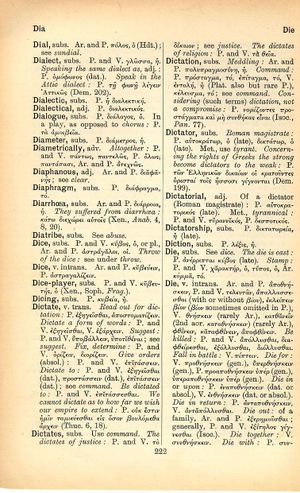die
Ἐπ' ἀνδρὶ δυστυχοῦντι μὴ πλάσῃς κακόν → Miseri miseriae ne quid affingas mali → Vermehre nicht dem Unglücksraben noch sein Leid
English > Greek (Woodhouse)
subs.
See dice.
The die is cast: P. ἀνέρριπται κύβος (late).
Stamp: P. and V. χαρακτήρ, ὁ, τύπος, ὁ, Ar. κόμμα, τό.
v. intrans.
Ar. and P. ἀποθνήσκειν, P. and V. τελευτᾶν, ἀπαλλάσσεσθαι (with or without βίου), ἐκλείπειν βίον (βίον sometimes omitted in P.), V. θνήσκειν (rarely Ar.), κατθανεῖν (2nd aor. καταθνήσκειν) (rarely Ar.), φθίνειν, καταφθίνειν, ἀποφθίνειν.
Be killed: P. and V. ἀπόλλυσθαι, διαφθείρεσθαι, ἐξόλλυσθαι, διόλλυσθαι.
Fall in battle: V. πίπτειν.
Die for: V. προθνήσκειν (gen.), ὑπερθνήσκειν (gen.), P. προαποθνήσκειν ὑπέρ (gen.), ὑπεραποθνήσκειν ὑπέρ (gen.).
Die in or upon: P. ἐναποθνήσκειν (dat. or absol.), V. ἐνθνήσκειν (dat. or absol.).
Die in return: P. ἀνταποθνήσκειν, V. ἀνταπόλλυσθαι.
Die out: of a family, Ar. and P. ἐξερημοῦσθαι; generally, P. and V. ἐξίτηλος γίγνεσθαι (Isoc.).
Die together: V. συνθνήσκειν.
Die with: P. συναποθνήσκειν (absol.), συναπόλλυσθαι (absol.), Ar. and V. συνθνήσκειν (dat.), V. συνόλλυσθαι (dat.), συνεκπνεῖν (dat.).
Die a lingering death: P. δυσθανατεῖν.
Dying a lingering death: V. δυσθνήσκων.

